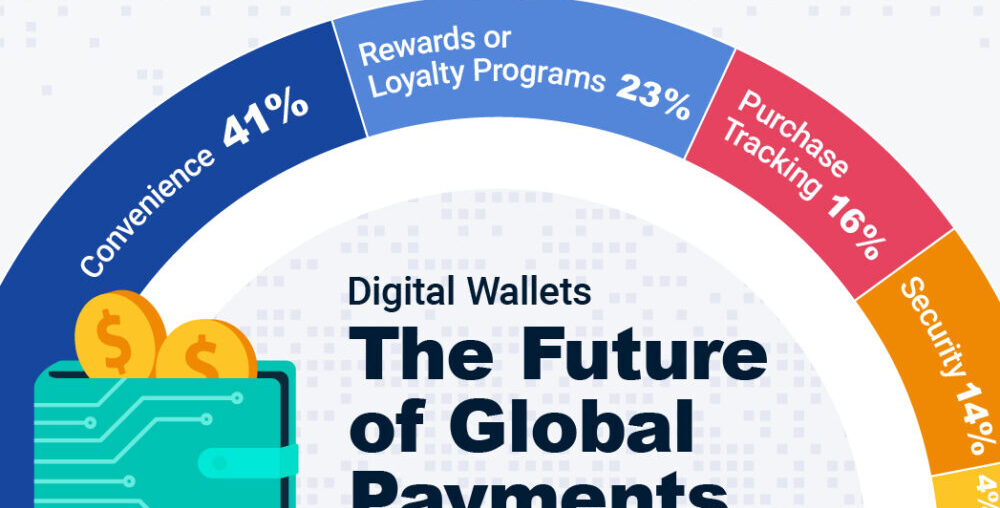The Fintech Frontier: How Digital Wallets Are Changing Payments
From bartering to cash to digital options, the way people pay for things has changed substantially over time. Innovation in financial technology, also known as fintech, is transforming the payment industry.
In this graphic from MSCI, we explore the popularity of digital wallets and how investors can track the performance of fintech companies through indexes.
Top Global Payment Methods
Globally, cash and cards no longer make up the lion’s share of retail transactions. Instead, digital wallets have become the top choice for online shopping. These wallets store a person’s payment information on a device so they don’t need to carry physical cards. Common examples are Apple Pay and Google Pay.
Currently, digital wallets account for half of total ecommerce transactional value, with credit cards a distant second at 22% of the total.
| 2023 | 2027p | |
|---|---|---|
| Digital Wallet | 50% | 61% |
| Credit Card | 22% | 15% |
| Debit Card | 12% | 8% |
| Account to Account | 7% | 8% |
| Buy Now Pay Later | 5% | 5% |
| Other* | 3% | 2% |
The trend holds true for in-store shopping as well. Digital wallets currently account for 30% of total transactional value, but that number is projected to reach 46% by 2027. Meanwhile, cash is expected to decline from 16% to 11% of transactional value.
What Drives Digital Wallet Use?
For companies developing digital wallets, low customer acquisition costs compared to other financial products have been essential to their growth. On average, the cost to obtain a digital wallet customer is $20 while it can range from $250 to $1,500 for credit cards.
Digital wallets also offer consumers a variety of benefits depending on the individual wallet. In one survey, people said the top reason for using a digital wallet is convenience.
| Primary Reason for Using Digital Wallet | % of Respondents |
|---|---|
| Convenience | 41% |
| Rewards or Loyalty Programs | 23% |
| Purchase Tracking | 16% |
| Security | 14% |
| Efficient Checkout Process | 4% |
| Other | 3% |
Notably, half of consumers said they would stop shopping with a merchant if it didn’t accept digital wallets.
MSCI and Fintech Innovation
The MSCI Fintech Innovation Indexes include companies associated with the development of new products and services as a result of technological innovation in the financial sector.
There are two indexes within this theme:
- The MSCI ACWI IMI Fintech Innovation Index includes securities from 23 developed and 24 emerging markets.
- The MSCI World IMI Fintech Innovation 30 Index provides exposure to the top 30 global companies by market capitalization that are related to the theme.
The MSCI ACWI IMI Fintech Innovation Index comprises mainly large-cap companies in the finance or IT sectors. For instance, Nvidia, Apple, Tencent, Mastercard and Visa are the top five constituents.
Since 2014, the index has outperformed its benchmark in eight of 11 years.
| Fintech Innovation | MSCI ACWI IMI | |
|---|---|---|
| 2024 YTD | 26.8% | 17.8% |
| 2023 | 29.3% | 21.6% |
| 2022 | -32.7% | -18.4% |
| 2021 | -2.7% | 18.2% |
| 2020 | 58.1% | 16.3% |
| 2019 | 44.1% | 26.4% |
| 2018 | 0.4% | -10.1% |
| 2017 | 42.3% | 24.0% |
| 2016 | 15.3% | 8.4% |
| 2015 | 10.0% | -2.2% |
| 2014 | 2.5% | 3.8% |
MSCI thematic indexes are rules-based, transparent, and regularly updated to take advantage of technological innovation.

